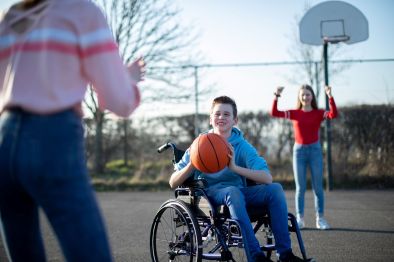Love the Skin You’re In: Tips for Cultivating Healthy Body Image in Our Kids
Author: Dr. Natalie Chapman
In today’s culture, the media, magazines, and movies depict body images of unattainable perfection. How do we cultivate healthy body image in ourselves and our children when we live in a world bombarded by portrayals of body ideals that are impossible to achieve?
Celebrate Differences
Not all bodies look the same. When we feel pressure to fit into a “box” we lose sight of the differences that make us unique and beautiful. Whether that is skin color, shape, or height, we are all different. Teaching our kids to not only acknowledge, but also appreciate those differences can positively influence the way they view themselves and their peers.
Abilities vs. Appearances
Teach your kids to focus on what their bodies can do rather than how they look. When we focus on seeing our bodies as objects measured in weight, attractiveness, and appearance, we can easily get stuck in a cycle of comparison with media and cultural ideals of body image, potentially leading to negative views of ourselves.
Challenging this approach, we can instead help shift our children’s focus toward what their bodies can do. Our bodies are amazing and can help us do all kinds of things! Our bodies allow us to spend time with friends, our brains allow us to learn, our hearts allow us to care, our bodies help us do sports… you get the idea!
You might be surprised to hear that this is a view that we as parents can unintentionally begin to perpetuate as early as infancy! Think about the way we talk about babies. Those “cute chunky thighs and chubby cheeks.” From day one we are focusing on the way those babies and young children look. Challenge yourself to comment on your children’s abilities and virtues as they develop. “Wow, you are so strong!” “That was very brave of you!”
Focus on Health, Not Weight
When it comes to promoting healthy bodies, let’s help children do just that. Instead of focusing on a number on the scale or size of clothing as a measure of health, focus on delicious and healthy food choices and fun physical activities. Most kids don’t need a strict work out routine—they need to play! Instead of focusing on the way our bodies look, shift the focus to how nutrition and fitness goals can help us take care of our bodies.
Be Mindful of How You Talk About Bodies & Food
How parents feel and talk about their own bodies has a powerful influence on their kids. Children learn how they should feel and think about their own bodies by listening to the adults around them. Be aware of and focus on shifting language used to talk about your own body. This includes being aware of “diet talk,” discussing calories and weight, labeling foods as “good or bad.”
Effort vs. Outcome
 A small, but significant shift we can in supporting our children in building positive self-esteem and body image is to be mindful of the way in which we are communicating with them. One way of doing this is to focus on praising them for their efforts, regardless of the outcome. A common example comes up in sports. When we focus on whether our kids won or lost the game, we are teaching them that the only thing that matters is the outcome. Encouraging kids to enjoy the process and experience, including social relationships and supports, team building, working hard and working together, rather than only work toward a reward, enhances their self-esteem and also provides an emotional buffer to cope with the inevitable losses.
A small, but significant shift we can in supporting our children in building positive self-esteem and body image is to be mindful of the way in which we are communicating with them. One way of doing this is to focus on praising them for their efforts, regardless of the outcome. A common example comes up in sports. When we focus on whether our kids won or lost the game, we are teaching them that the only thing that matters is the outcome. Encouraging kids to enjoy the process and experience, including social relationships and supports, team building, working hard and working together, rather than only work toward a reward, enhances their self-esteem and also provides an emotional buffer to cope with the inevitable losses.
Some examples might include, “I’m proud of you for how much effort you put in to that activity!” “I can see you worked really hard on that project!” This shifts the focus from the outcome (grades, win/lose) and turns it toward recognition of the child’s effort—something that they are in control of. This, in turn, can help build confidence in their abilities, shifting the focus from aspects such as their performance and appearance.
Other Ways to Improve Self-Esteem, Self-Worth, & Body Image
So often we find our self-esteem rooted in the way our bodies look, but there are actually many many components that go into building our sense of self-worth. One of the ways we build self-esteem is through experiencing success. Find opportunities for your child to feel successful! What are their interests? What are their hobbies?
We also know that we build self-esteem and a sense of who we are based on the feedback we get from others. As parents, being mindful of the way in which we are communicating to our children, and shifting focus if needed, can be impactful. It is often easy to fall in a trap of being “nitpicky” and focusing on areas that need improvement, while forgetting to praise our kids for things they are doing well. The idea is not that we should never tell kids to change certain behaviors, but to balance this with acknowledgement of things they are already doing well. With all of this in mind, try to focus on praising your kids for things such as their virtues, abilities, and efforts rather than their physical appearance.
-Be Aware of Some of The Warning Signs of Eating Disorders-
Unfortunately, it is never too early for these warning signs to begin to appear (even before puberty). Watch out for signs like: refusing typical family meals, skipping meals, negative comments about body image, like “I’m too fat; they’re too fat,” clothes shopping that becomes stressful, withdrawal from friends, irritability and sadness, or any signs of extreme dieting, bingeing or purging. If you think your child might be struggling with any of these warning signs, support is available.
Shared Vision’s Resources
Individual Therapy
Individual psychotherapy can be a dynamic and rewarding process to gain meaning and bring about lasting change. It’s our goal to provide a collaborative and safe environment where you and your therapist work together to achieve your goals. Click here for more information.
Parent Consultation Services
Looking for support pertaining to parenting difficulties? Shared Vision offers Parent Consultation Services that can help. You can meet on a short-term or long term basis with a Licensed Clinical Psychologist that specializes in parenting and child development. During individual sessions you will have the opportunity to talk through any and all challenges that you might be experiencing. Click here for more information.







